Rivers of Justice: Insights from the Cleveringa Lecture 2023
Published:
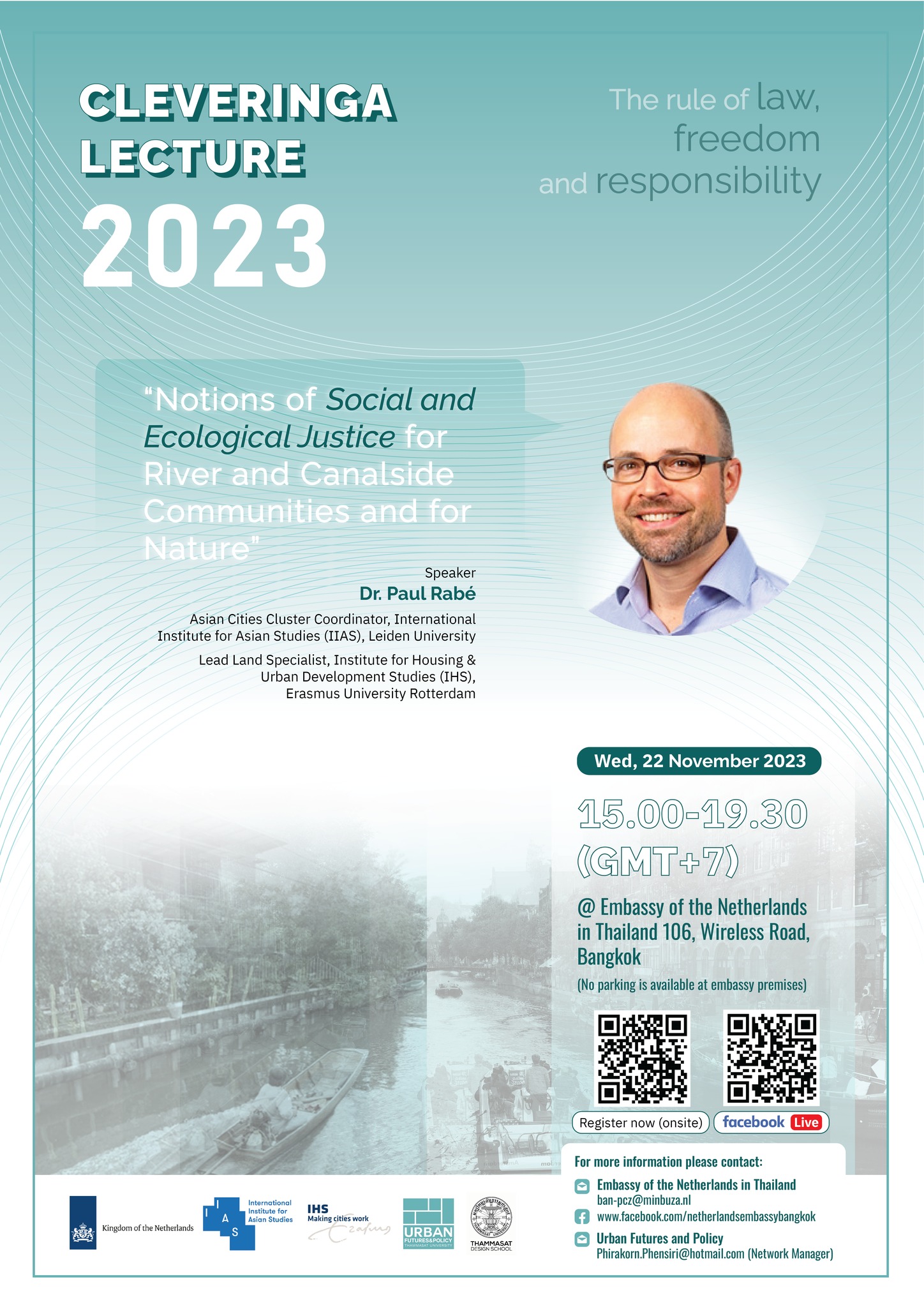
On November 22nd, 2023, I had the opportunity to attend the Cleveringa Lecture 2023 on the topic “Notion of Social and Ecological Justice for River and Canalside Communities and for Nature” at the Royal Netherlands Embassy in Thailand. This event, a collaboration between the embassy and the Urban Futures & Policy Research Unit of Thammasat University’s Faculty of Architecture and Planning, was more than just an academic gathering for me. It represented a fusion of my personal passion and professional pursuits in environmental and water management amidst the climate crisis. With a background in Arctic sea ice modeling, working with local communities in southern Thailand to protect their seas, and my experiences living in Thailand, a country grappling with frequent flooding, the relevance and urgency of this lecture resonate deeply with me.
In this post, I intend to share the key takeaways from this enlightening lecture. My aim is to distill the essence of the lecture, reflecting on how these lessons can be applied globally and locally, in hopes that they will inspire and inform others as much as they have me. The insights gained are not only pivotal to my understanding of sustainable and just water management but are also crucial for anyone concerned about our collective response to environmental challenges. To enhance your understanding, most of the images included in this post are from Dr. Rabe’s presentaion, providing visual context to the topic discussed.
The Historical Significance of Cleveringa
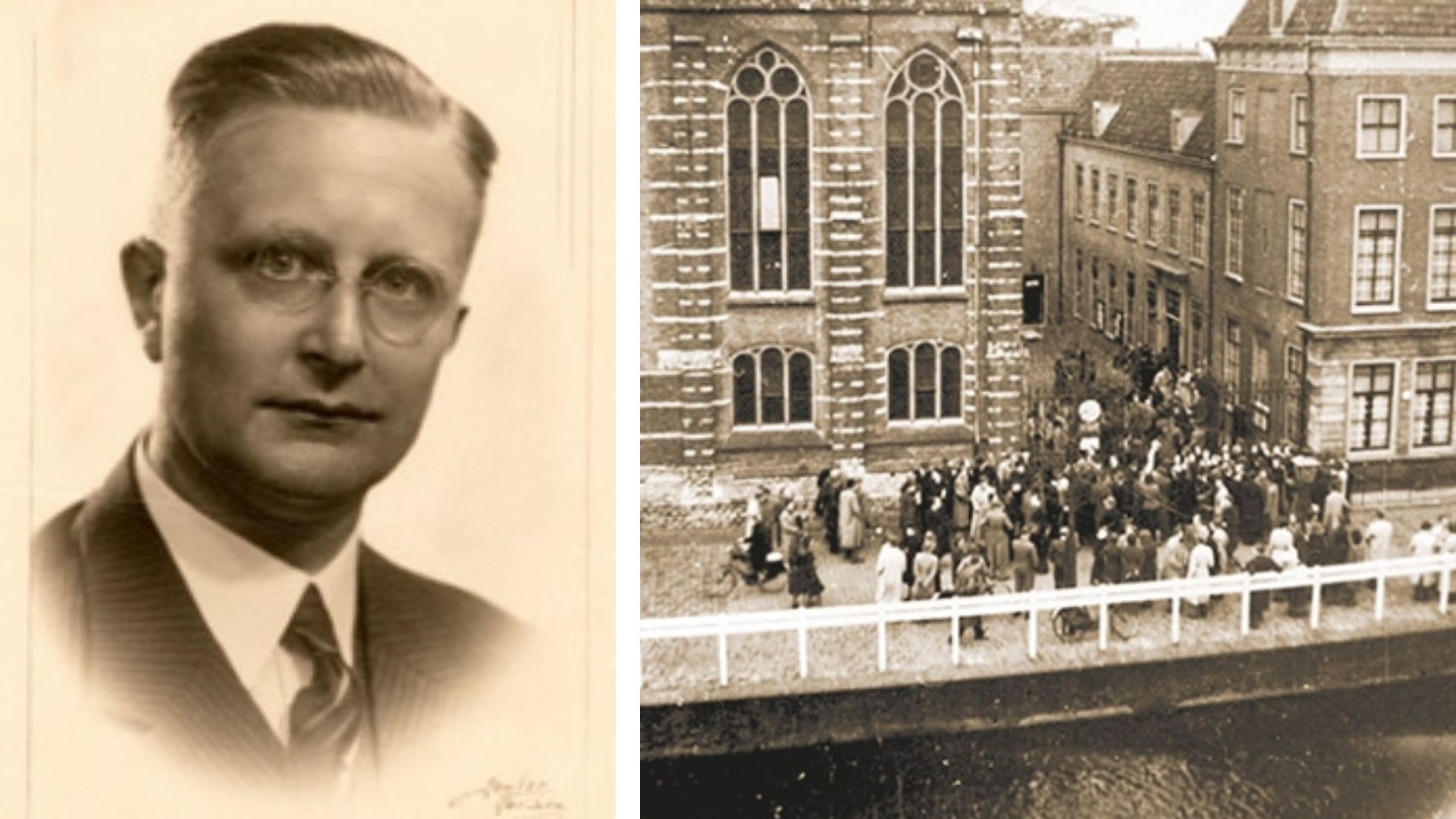
Professor Rudolph Cleveringa (left) and gathering of students in front of the Academy building after the lecture of Professor Cleveringa (right) / Source: Leiden University's website
The Cleveringa Lecture serves as a potent reminder of Professor Rudolph Cleveringa’s stand during one of the darkest chapters in history. His defiance against Nazi oppression by speaking out against the dismissal of Jewish colleagues at Leiden University became a beacon of resistance. These lectures, now held globally, delve into themes of law, freedom, and responsibility, symbolizing the perpetual struggle against injustice. Cleveringa’s act of courage, leading to the temporary closure of Leiden University, is commemorated through these lectures, which today resonate with the urgency to confront our environmental challenges and injustices.
Dr. Paul Rabe’s Expertise and Vision
Dr. Paul Rabe, a political scientist and a distinguished academic from Leiden University, helmed this year’s lecture. His topic, “Social and Ecological Justice for River and Canalside Communities”, was not only timely but also close to my heart. Dr. Rabe’s roles as head of the Cities Cluster at the International Institute for Asian Studies (IIAS) and coordinator of the River Cities Network (RCN) have positioned him uniquely at the intersection of urban development and environmental stewardship. His expertise in navigating the complex dynamics between urban spaces and their waterways provided a multifaceted perspective crucial for understanding the nuanced challenges of water management.
The Urgency of Environmental Challenges
Dr. Rabe addressed the overarching issue of global warming in our current Anthropocene era. He drew a compelling parallel between the moral fortitude exemplified by Professor Cleveringa during World War II and the kind of courage we need today to tackle the entwined environmental, economic, and political injustices. Highlighting the vicious cycle of unsustainable practices, Dr. Rabe emphasized the critical need for a shift in our approach to nature and sustainable development. He spoke about the degradation of rivers as a result of unsustainable energy use, land development, urban sprawl, deforestation, mining, and pollution, stressing that these actions not only harm our environment but also perpetuate a cycle of ecological and social injustice.
Comparative Approaches to Water Management of Thailand and the Netherlands
A highlight of Dr. Rabe’s lecture was his detailed exploration of water management strategies in Thailand compared to the Netherlands, offering a stark illustration of how different societies respond to similar environmental challenges.
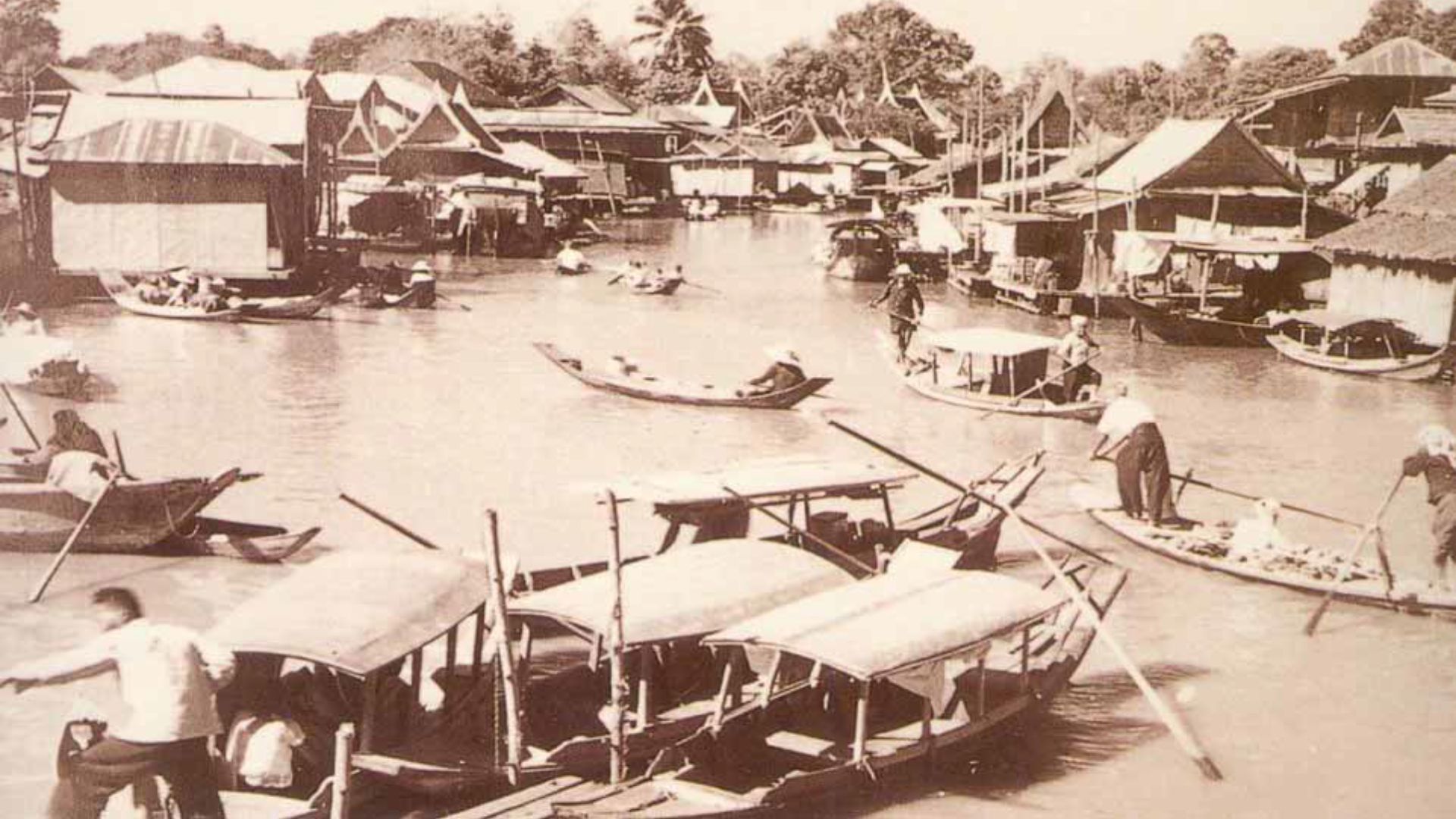
Bangkok in the early 20th century: an example of traditional resilience / Source: Unseen Siam
In Thailand, Dr. Rabe traced the evolution of water-centric living. Historically, Thai communities were intricately linked to their waterways. Canals were not just physical entities but lifelines that shaped culture, transportation, and trade. He described how, in the early 20th century, Bangkok’s landscape was dominated by canals, and boats were the primary mode of transportation. Homes and communities were built with an intimate connection to water, embodying a lifestyle that respected and adapted to the natural ebb and flow of riverine and canal systems. This relationship represented a form of traditional resilience, harmonizing human existence with the aquatic environment.
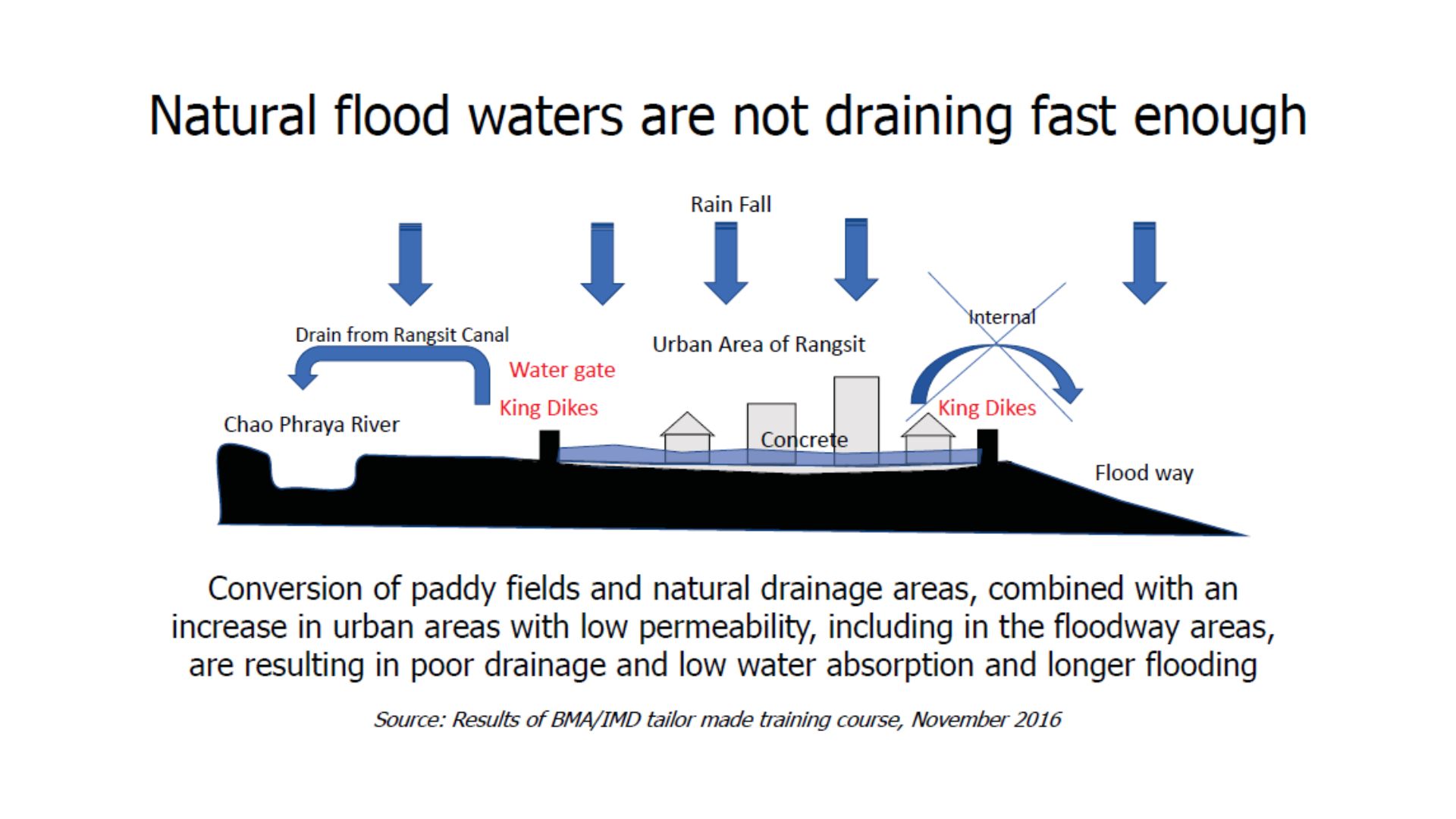
Bangkok's urbanization / Source: Bangkok Metropolitan Administration
However, Dr. Rabe pointed out that modern Thailand has undergone a significant shift. Rapid urbanization, driven by economic growth and population increase, has transformed the landscape. This change, while bringing development, has also led to critical environmental challenges. Paddy fields and natural drainage areas have been converted for urban use, leading to reduced water absorption and poor drainage. These changes, coupled with an increase in impermeable urban surfaces, have exacerbated flooding problems. The lecture emphasized that while these developments supported a modern society’s needs, they also distanced communities from their traditional, water-centric way of life, creating a disconnect with the natural water systems.
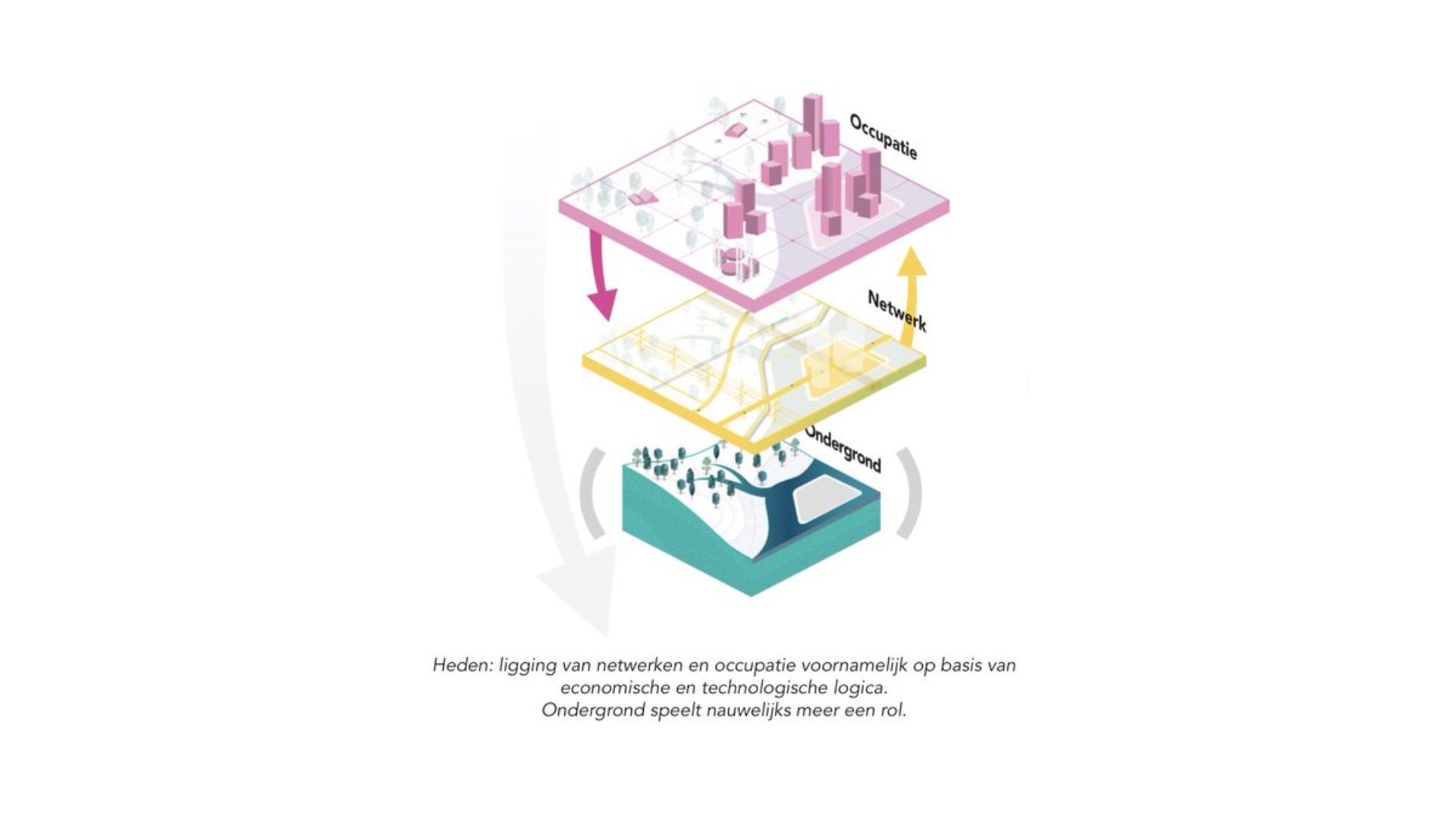
Layer Approach / Source: College van Rijksadviseurs
Contrastingly, Dr. Rabe presented the Netherlands as a nation that has embraced a more systematic and holistic approach to water management. Recognizing the multifaceted nature of water-related challenges, the Dutch strategy encompasses a wide array of considerations, including climate change, energy, mobility, economy, agriculture, social justice, and water itself. He detailed how the Netherlands, a country with a significant portion of its land below the sea level, has historically battled with water. Instead of fighting against it, the Dutch have developed an integrated approach that respects and works with their aquatic landscape.
This involves a layer approach. At the foundational level, it deals with natural resources, acknowledging the threats posed by heavier rainfall, increased river discharge, rising sea levels, and soil seepage, while also considering water scarcity and drinking water quality. The next layer focuses on networks - not just physical infrastructures but also social and digital connections that influence how communities interact with their environment. The top layer addresses occupation, emphasizing sustainable and equitable urban and land development. The Dutch model, thus, is not just about managing water; it is about rethinking the relationship between people, land, and water in a holistic manner.
Dr. Rabe’s comparative analysis of Thailand and the Netherlands offered profound insights into how different cultural, historical, and geographical contexts shape water management strategies. It underscored the importance of not only addressing the immediate technical aspects of water management but also considering the broader societal, environmental, and ethical implications.
Innovative Solutions for Water Management and Social Justice
Dr. Rabe’s lecture transitioned into a crucial segment, addressing the innovative solutions that can be employed to tackle the challenges of water management and social justice. His insights provided a roadmap for a future where human development and environmental sustainability can coexist harmoniously.
Transitioning to Public Well-being: Dr. Rabe introduced the concept of transitioning from an economy focused on private wealth to one centered on public well-being. This paradigm shift places the well-being of people and their relationship with the environment at the forefront. The quality of our living environments becomes a key economic factor, necessitating a balance between development and ecological preservation. This approach calls for reimagining our urban space and policies to prioritize communal health, sustainability, and equitable access to natural resources.
Nature-guided Development: Reversing the traditional order of urban development, a nature-guided approach was proposed. Instead of seeing occupation and urbanization as forces that shape and often dominate the natural landscape, he suggested a model where natural ecosystems guide development decisions. This approach would involve more than just environmental conservation; it would mean integrating nature’s pattern and resilience into the very fabric of urban planning and design, ensuring that development works in tandem with, rather than against, ecological systems.
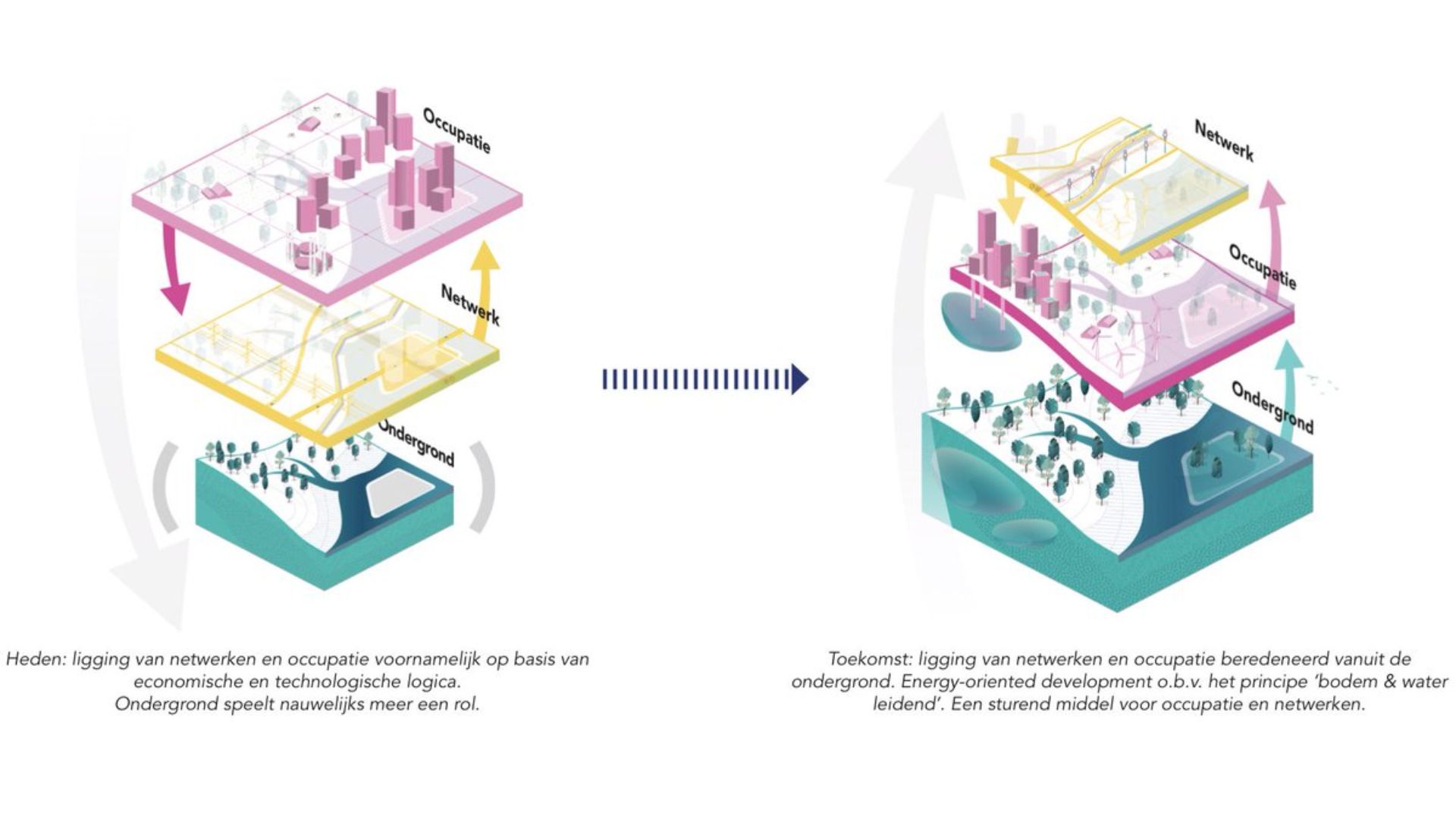
Nature-guided Development: Reversing the layers / Source: College van Rijksadviseurs
The Room for the River program: An exemplary model that Dr. Rabe highlighted was the Netherlands’ “Room for the River” program. This innovative initiative, operational between 1997 and 2017, aimed to create more space for rivers, allowing them to flow more freely and manage high water levels more effectively. The program didn’t just focus on flood prevention; it also sought to enhance the aesthetic and recreational value of river landscapes, proving that environmental projects can yield multifaceted benefits.
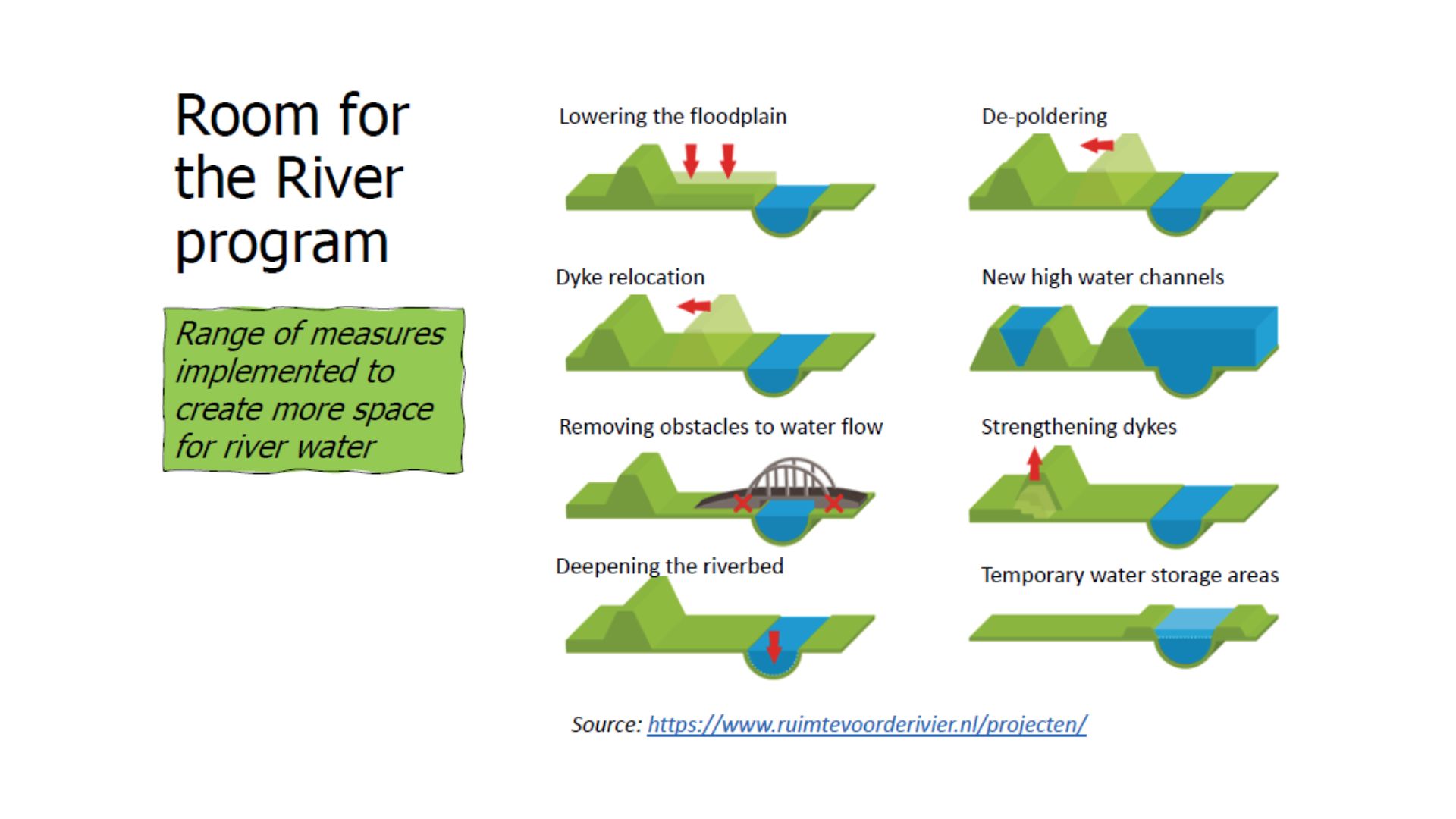
Room for the River approaches to create more space for water
Doughnut Economics Model: The concept of Doughnut Economics was developed by an economist Kate Raworth. This model presents an economic framework that balances essential human needs with the planet’s ecological limits. It’s portrayed as a doughnut-shaped diagram where the inner ring represents the ecological ceiling. The space in between - the doughnut - is the safe and just space for humanity. This model challenges the traditional focus on GDP growth and advocates for a holistic approach to economic development, taking into account social and planetary boundaries.
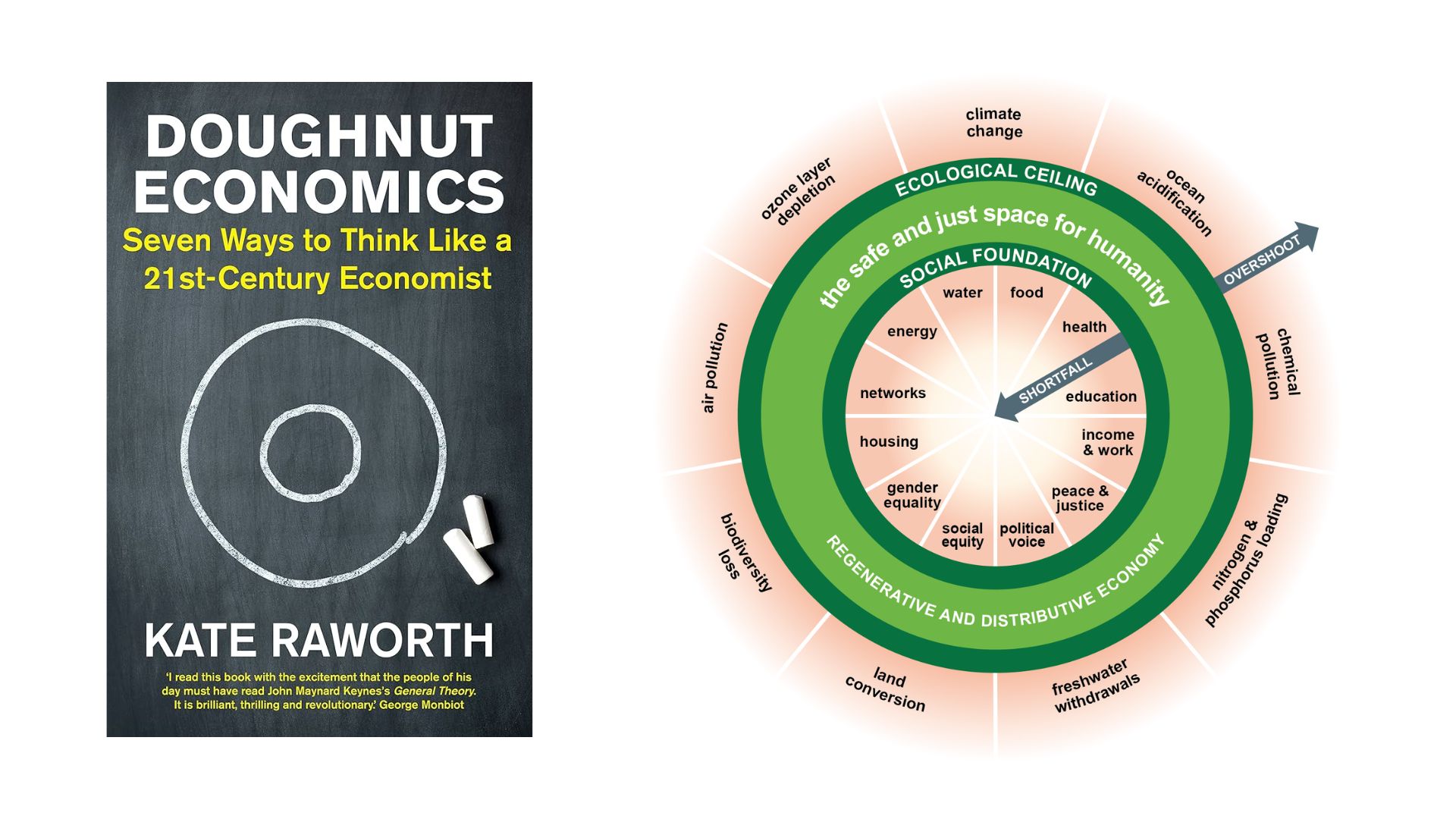
Doughnut Economics written by Kate Raworth (left) and the proposed model (right)
Dr. Rabe’s discussion of these strategies and models underscored the need for a transformative approach to water management and urban development. By integrating concepts like public well-being, nature-guided development, innovative flood management, and sustainable economic models, he provided a comprehensive blueprint for addressing the multifaceted challenges posed by climate change and urbanization.
River Cities Network (RCN)
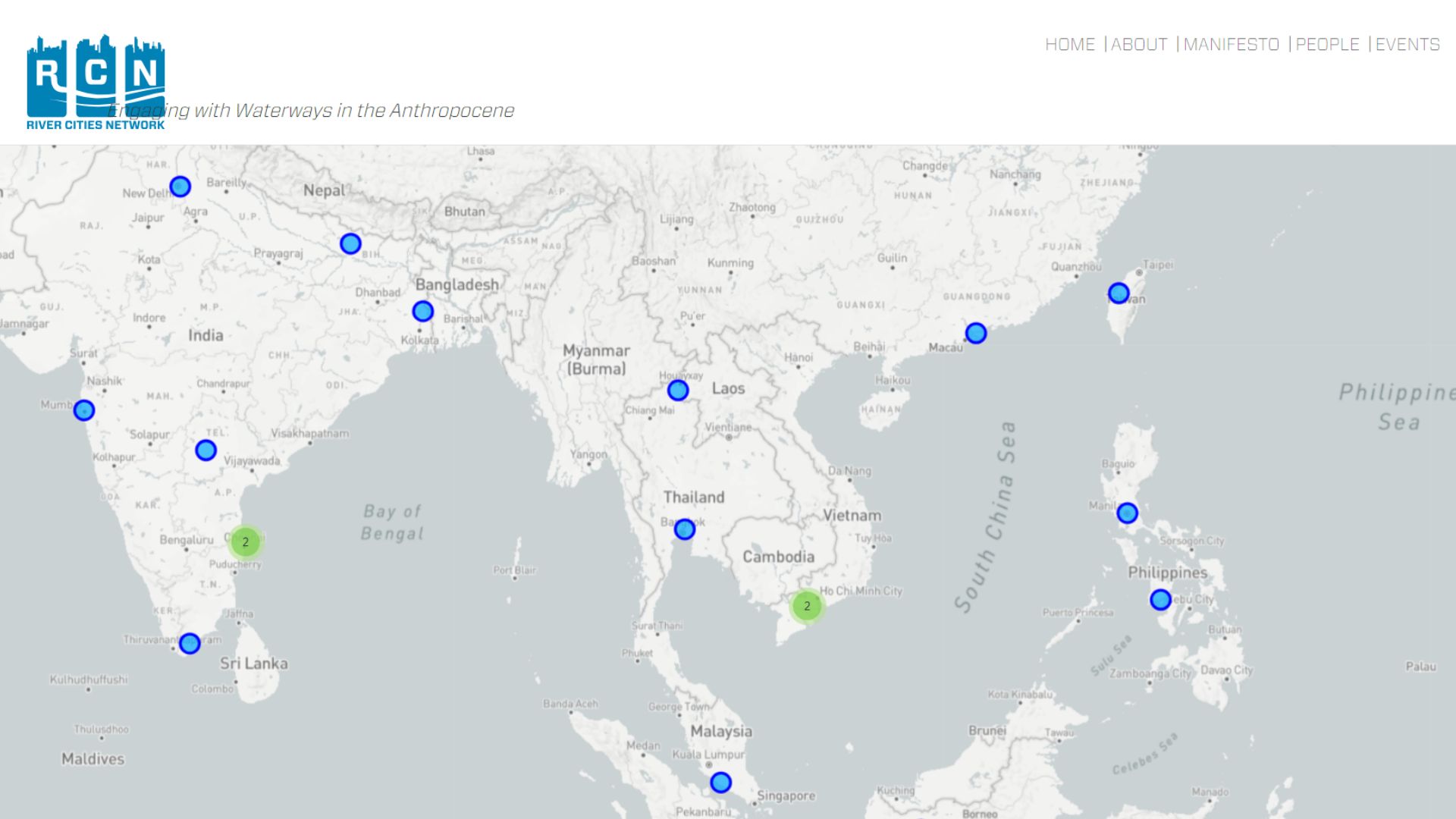
River Cities Network's website
In his lecture, Dr. Rabe emphasized the significant role of the River Cities Network (RCN) in advancing sustainable relationships between urban areas and their waterways. The main objectives of RCN are promoting justice and enhancing biodiversity, aiming to establish equitable and ecologically mindful urban water management practices.
The RCN is distinguished by its collaborative and interdisciplinary nature, uniting experts from around the globe. It includes projects teams from diverse locations, including Thailand and the Netherlands, allowing for a rich exchange of experiences and strategies. Dr.Raby himself was in Thailand as part of his involvement with the RCN, highlighting the network’s active role in fostering international collaboration.
The network’s focus extends to ensuring equitable access to water resources and addressing socio-economic impacts on local communities. In terms of biodiversity, the RCN is committed to preserving and enhancing the ecological health of urban waterways, recognizing their crucial role in sustainable city life.
For more insights into the RCN’s work and their global initiatives, including their projects in Thailand and the Netherlands, visit www.rivercities.world
Dimensions of Justice
The lecture culminated in a profound discussion on the multifaceted concept of justice in the context of water management. This exploration was pivotal in understanding how decisions about water and its management can have far-reaching implications across different spheres of society.
Distributive Justice: Dr. Rabe emphasized the importance of distributive justice, which revolves around the fair allocation of resources. In water management, this pertains to how water resources are distributed among different communities, regions, and stakeholders. Questions of equality and equity come to the forefront, challenging us to consider who gets access to water and in what quantity, and how these decisions impact various segments of society, especially the marginalized.
Political Justice: Political justice involves issues of representation, voice, and power in decision-making processes. This dimension is critical in water management, where decisions often affect diverse groups with varying degrees of influence and representation. Ensuring that all stakeholders, including local communities and minority groups, have a say in how water resources are managed is a key aspect of achieving political justice.
Cultural Justice: Cultural justice pertains to the recognition and respect for different cultural, normative, and governance traditions. Dr. Rabe pointed out that water management practices must acknowledge the cultural significance of water in different societies. This involves understanding traditional practices, indigenous knowledge, and local customs related to water, and integrating this understanding into management practices.
Socio-ecological Justice: This is about maintaining the integrity and sustainability of ecosystems for future generations. This dimension emphasizes the interdependence of human societies and natural ecosystems, advocating for practices that not only meet current human needs but also preserve the environment for future generations.
Dr. Rabe concluded this section by highlighting the often challenging choices and dilemmas that arise when considering these different forms of justice. For instance, the conservation of natural resources might conflict with human usage, or traditional knowledge might contrast with scientific expertise. These conflicts necessitate a careful and balanced approach, requiring an interdisciplinary perspective to navigate through these complex issues.
In essence, the exploration of justice in water management, as presented by Dr. Rabe, invites us to think deeply about the ethical and equitable dimensions of how we interact with our most vital resource—water. It calls for a holistic approach that considers a variety of perspectives and needs, ensuring that our water management practices are fair, inclusive, and sustainable.
Conclusion
The Cleveringa Lecture 2023, delivered by Dr. Paul Rabe, brought to the intricate and multidimensional challenges surrounding rivers and waterways. Key takeaways from the lecture include:
The Multidimensional Nature of Waterway Challenges: The issues we face in managing our rivers and waterways are not just complex; they are multi-layered, intersecting various aspects of environmental, social, and economic life. This complexity demands approaches that are equally nuanced and comprehensive.
Redefining Justice in Water Management: The concept of justice in the context of water management is far from one-dimensional. It varies significantly depending on local contexts and encompasses more than just human-centric concerns. True justice in water management must account for both human needs and the intrinsic value of nature, recognizing humans as an integral part of the natural world.
Beyond Expert Knowledge: The lecture underscored that while expert knowledge is invaluable, it is not sufficient on its own in the face of climate change’s uncertainties. Knowledge must be continually revised and updated, and decision-making in water management should involve local stakeholders. This inclusion ensures greater effectiveness and equity, acknowledging the limitations of sector-specific expertise and the value of diverse perspectives.
Thinking and Acting Like a River: Perhaps the most striking metaphor Dr. Rabe offered was the idea of thinking and acting like a river. Rivers, as socio-natural systems, symbolize the need for transdisciplinary approaches that transcend conventional sectoral boundaries. They remind us of the importance of holistic thinking, acknowledging both their power and vulnerability. In managing water, we must proceed with care, respecting the natural flow and recognizing the fundamental role rivers play in sustaining life.
In conclusion, the lecture calls for a shift in perspective - to view water management not just as a technical or infrastructural challenge but as an opportunity to foster a balanced relationship between humanity and nature. As we navigate the complexities of the Anthropocene, our approach to water management should be akin to the rivers themselves: adaptable, interconnected, and respectful of the delicate balance that sustains life.
Personal Reflections and Future Directions
The Cleveringa Lecture 2023 was more than an academic endeavor; it was a pivotal moment that broadened my understanding of global water management issues. The insights shared by Dr. Rabe resonated deeply with my own experience. Having worked on forecasting models for Arctic sea ice and living in Thailand, a country frequently confronting the challenges of flooding, I found a personal connection to the topics discussed. This lecture came at a crucial time in my life, as I am preparing to study abroad with the aim of applying my engineering skills to social and environmental causes. It served as a significant source of inspiration and reaffirmed my commitment to focusing my future research on water-related issues.
A particularly enriching moment came at the end of the lecture when I had the opportunity to ask about the role of data scientists in addressing these complex water management problems. The responses I received from Dr. Rabe and other attendees during the networking session were enlightening. It was an engaging exchange that opened my eyes to the various ways my expertise in data science can contribute to this field. I also had the pleasure of connecting with professionals who possess access to critical data on water management, disaster indices, and more. It was a moment of profound connection and joy, finding myself amidst people who share a common vision and dedication to solving these pressing global challenges.
This lecture has thus not only expanded my understanding of water management but has also reinforced my commitment to this field. It has connected me with a network of experts and resources, enhancing my readiness to contribute effectively to this vital area of environmental stewardship.
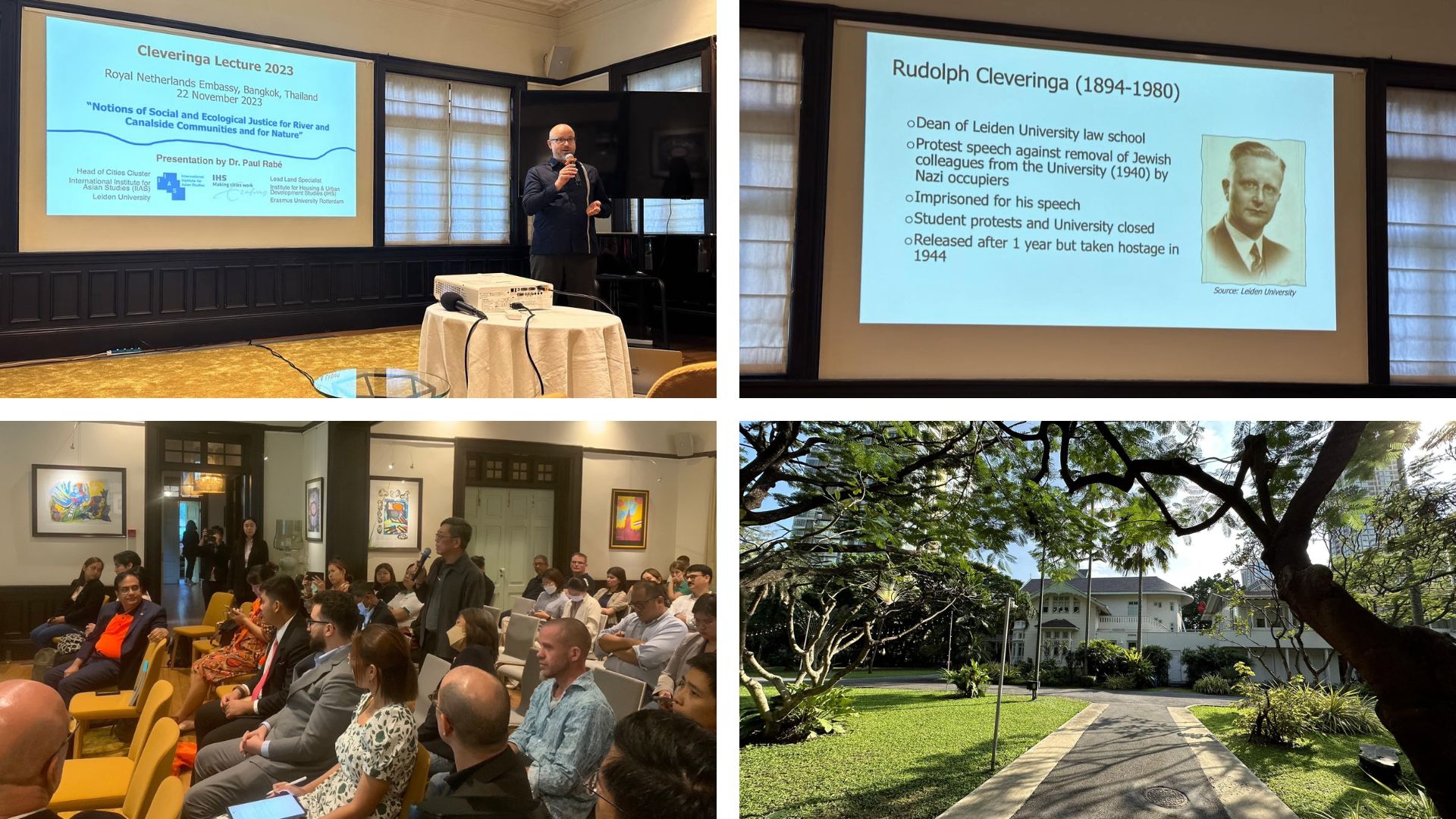
Cleveringa Lecture 2023 at the Royal Netherlands Embassy in Thailand
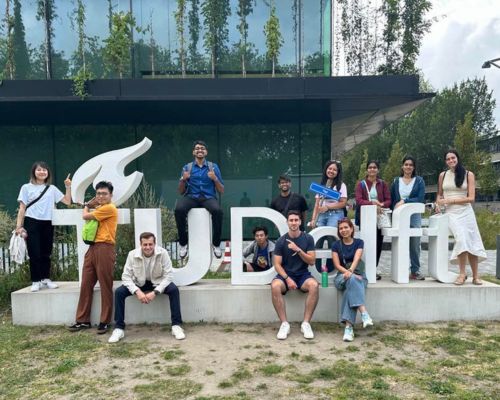 The time has finally come! I’ve arrived at TU Delft as a master’s student in the Engineering and Policy Analysis program! Delft and TU welcomed me with open arms, especially during the Introduction Program, where I met incredible new friends. It’s inspiring to be surrounded by people who share the same drive for self-improvement and the belief that we can create meaningful change through engineering, science, and interdisciplinary approaches.
The time has finally come! I’ve arrived at TU Delft as a master’s student in the Engineering and Policy Analysis program! Delft and TU welcomed me with open arms, especially during the Introduction Program, where I met incredible new friends. It’s inspiring to be surrounded by people who share the same drive for self-improvement and the belief that we can create meaningful change through engineering, science, and interdisciplinary approaches. Have you ever heard of or used IELTS Liz ? This post is about Liz, the owner of IELTS Liz. It’s an IELTS guide platform that has helped me develop my academic English skills. Even though I learned English through many platforms and teachers, her website was actually helpful, especially for writing—the skill I spent most of my time improving. I read almost every tip, trick, and free example given on her site. …
Have you ever heard of or used IELTS Liz ? This post is about Liz, the owner of IELTS Liz. It’s an IELTS guide platform that has helped me develop my academic English skills. Even though I learned English through many platforms and teachers, her website was actually helpful, especially for writing—the skill I spent most of my time improving. I read almost every tip, trick, and free example given on her site. …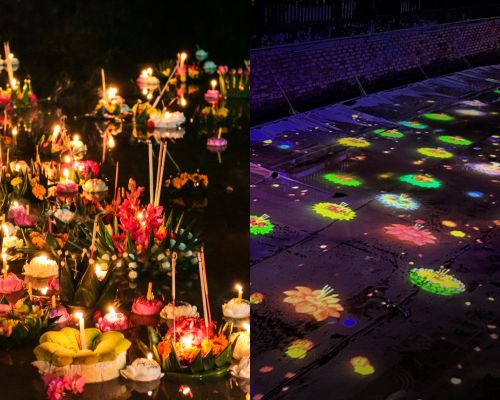 In recent years, it’s become clear that some of our most cherished traditions have unintended consequences on the environment. The Loy Krathong Festival in Thailand is a prime example. In 2022 alone, 572,603 krathongs were set afloat in the rivers of Bangkok. While 95.7% were made from biodegradable materials, the remaining 4.3% consisted of foam blocks that could be in our waterways for up to 400 years if not properly managed. Even materials like …
In recent years, it’s become clear that some of our most cherished traditions have unintended consequences on the environment. The Loy Krathong Festival in Thailand is a prime example. In 2022 alone, 572,603 krathongs were set afloat in the rivers of Bangkok. While 95.7% were made from biodegradable materials, the remaining 4.3% consisted of foam blocks that could be in our waterways for up to 400 years if not properly managed. Even materials like …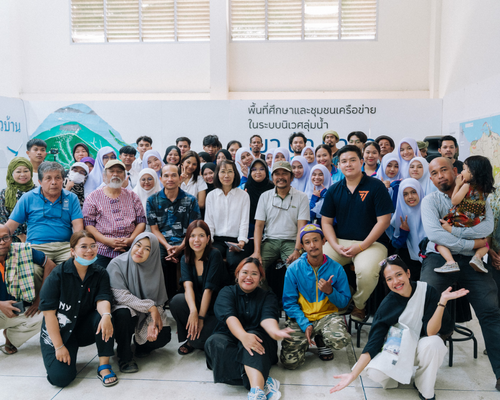 On Sunday, October 8th, 2023, I had an honor of being part of something truly special. Together with my incredible team at Around the Room Studio and the chief of the Natural History Museum and Local Learning Network, we hosted an event— “Community Database: The Power of Driving Participatory Society”. As a moderator of the event, I witnessed the fruition of a journey that started with our workshop series titled “Participatory Mapping & Community Database Design”, …
On Sunday, October 8th, 2023, I had an honor of being part of something truly special. Together with my incredible team at Around the Room Studio and the chief of the Natural History Museum and Local Learning Network, we hosted an event— “Community Database: The Power of Driving Participatory Society”. As a moderator of the event, I witnessed the fruition of a journey that started with our workshop series titled “Participatory Mapping & Community Database Design”, …